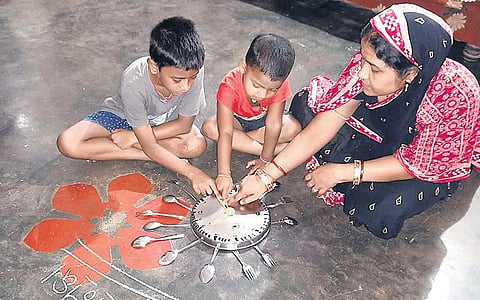

Barsha was looking forward to school this year. But with the world in viral chaos her plans went awry. Coming from an underprivileged area in Cuttack district in Odisha, there was little her parents could do. The same was the case with Amitav Mallick, a resident of Kendrapara district. He was worried that with no internet at his disposal, his four-year-old son Sahin would lose interest in learning. ThinkZone—an award-winning social enterprise that works towards improving the educational outcomes of children from under-resourced communities—came to their rescue. Using a ‘tech plus touch’ model and activity-based methodology, the platform empowers community educators, school teachers, public childcare workers and parents to deliver quality early-childhood and primary grade education.
Binayak Acharya, founder and CEO, says, “We have tried to build a localised tech-based pedagogy for first-generation learners. Besides, it helps to improve the skills of facilitators who come from a limited educational background.” ThinkZone’s home-based model of learning is targeted at communities who have limited access to the internet. “Due to the ongoing crisis children from low-income families do not have access to education. We are reaching out to parents so that they can engage them in activity-based learning,” he adds. Access to the content is free of cost.
Designed for children aged 3-10 years, the platform uses ‘voice call and SMS-based’ tools to reach out to parents. The user-friendly modules can be understood and implemented by parents regardless of their literacy level. “We focus on foundational skills in Odia and Maths. It takes a maximum of 10 minutes to practice an activity,” says programme manager Snehanshu Shome. The platform uses various methods to make this possible. Pre-recorded descriptive audio versions of text messages are sent ensuring that parents, who are not able to read, receive the messages.
Parents then call a toll-free number for audio instructions for activities. The activities can be accessed in Odia, Hindi and English, according to age and class levels. “We also share a daily activity sheet via WhatsApp, which students practice and send back to us via photos,” says technology head Nrusingha Nath Nayak. Also, content via text is shared every day to ensure that families without smartphones can access them.Programme manager Itishree Behera says, “We have also reached out to radio stations in different states. After our month-long pilot programme ‘Radio re Patha Padha’ in Odisha, we are implementing ‘Ghar ki Pathshala’ programme in Maharashtra.” Their goal is to directly impact 10,000 children and also reach out to 20,000 parents by next year.